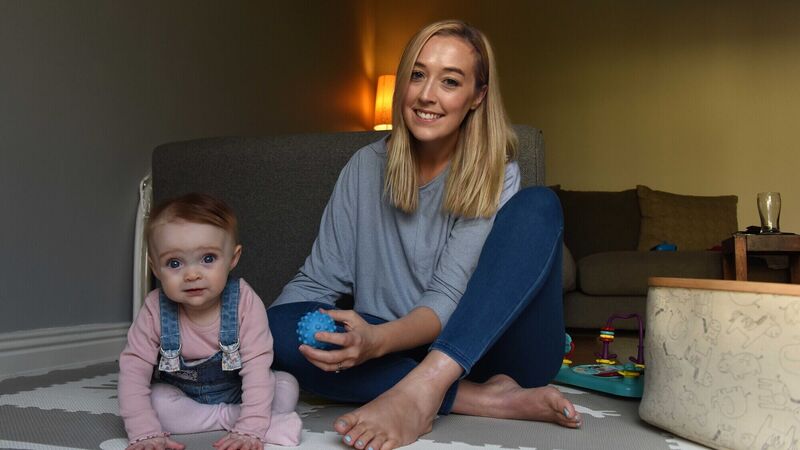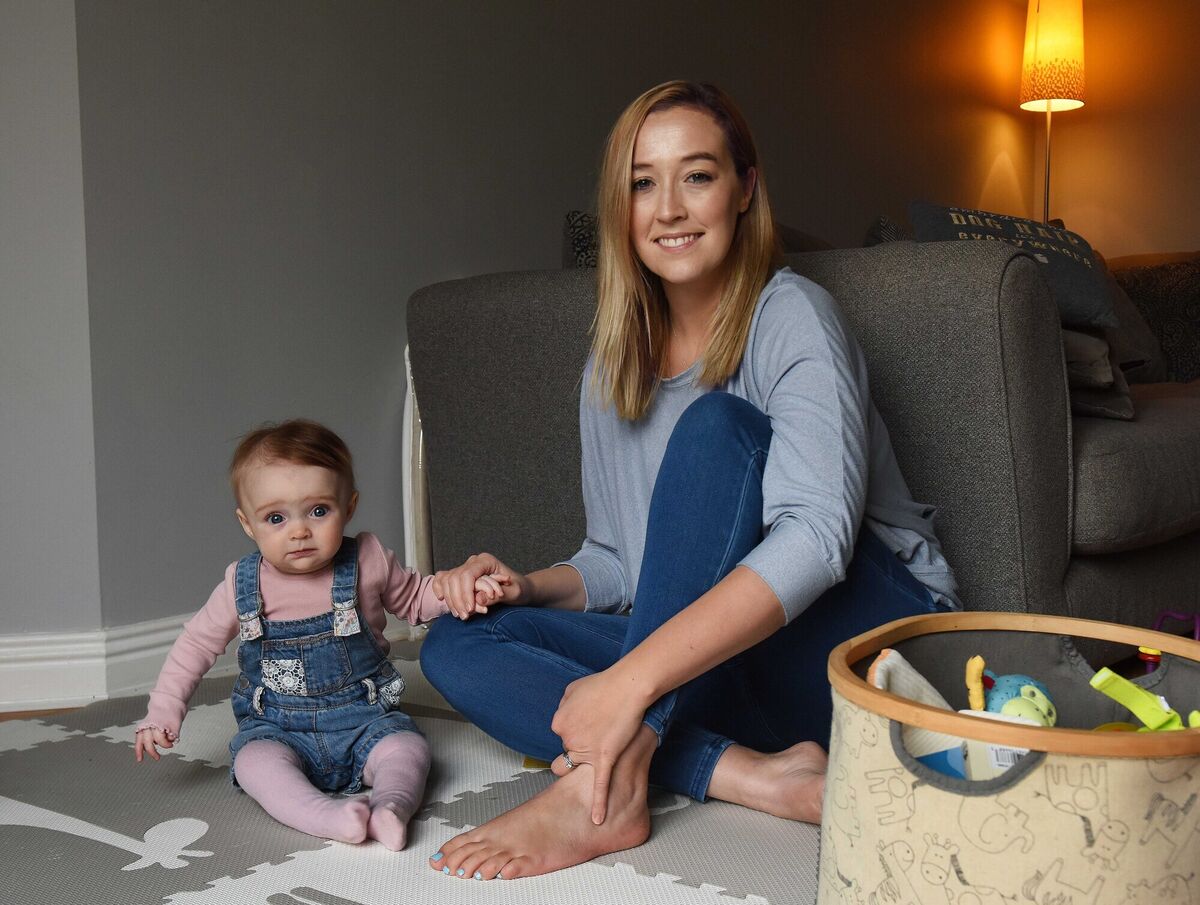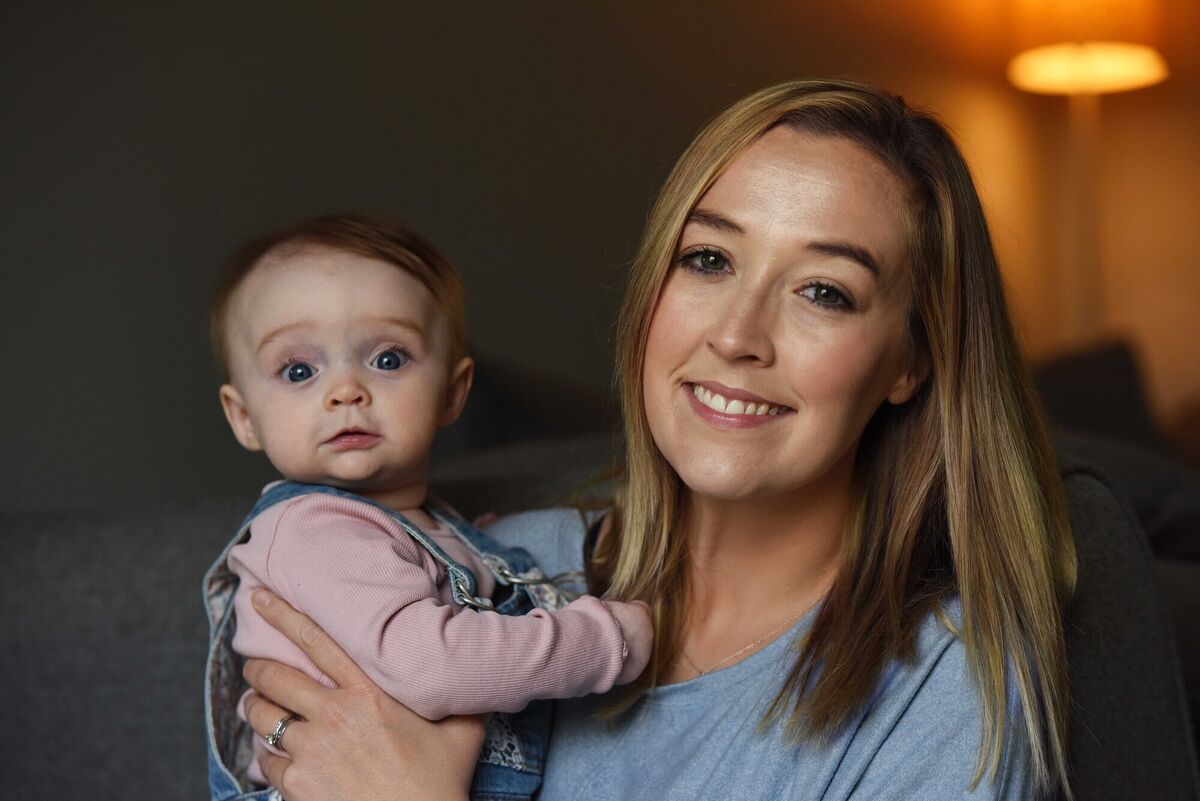Special delivery: Home birth for first-time mum

Gill McPhail, from Rush, Co Dublin, with her six-month-old daughter Ellie who as born at home.
WHEN Gill McPhail was pregnant with her first child, she was certain of one thing — she wanted to feel in control when giving birth.
For Gill, a social care worker in an intellectual disability service and a yoga teacher, that meant having her baby at home. There, in her ideal scenario, she could have a water birth, with the help of a midwife who she knew and trusted and who would be there for her during her post-natal care.
For many women, the thought of a home birth on their first pregnancy may be terrifying, but all went according to plan when Gill gave birth to Ellie, a lockdown baby, in April.
“I wanted to try and be in as much control as possible over the birth,” says Gill “I wanted to have familiar surroundings, home comforts, and, probably the most important thing, I wanted continuity of care so I really wanted to know my midwife.”
The recent first-ever National Maternity Experience study found that women in Ireland who chose to have a home birth reported a more positive experience than those who gave birth in a maternity unit or hospital.
According to the HSE, there were 130 home births in Ireland in 2019.

Gill, who's aged 29 and lives in Rush, Co Dublin, says that she never wavered at all in her decision to stay home.
The Covid-19 pandemic played a part too. “It was April 15 when I gave birth, so it was quite early into the [lockdown] changes, and I didn’t want to have to go into hospital and be exposed to the clinical setting.”
But she was open to changing her mind, if necessary — if she needed pain relief or her midwife felt that the situation wasn’t safe and she needed to be transferred to a maternity unit.
Nanni Schluenz, Gill’s midwife, says that the transfer rate for first-time mothers is 50%, but she thinks a home birth is a good option for first-time mothers because of the continuity of care that they receive. “I know my patients. I know what they look like when they’re not right and I know what their personality is like and what’s normal for them,” she says.
It was important for Gill to have an unmedicated birth, if possible. “I wanted to feel the birth in its raw state — if I was able for it. Because, obviously, you don’t know as a first-time mum, how the birth is going to go.”
To give herself the best chance of bringing her baby into the world at home, Gill did her homework throughout the pregnancy. She practised a lot of pregnancy yoga, meditation and hypno-birthing, as well as going to what she describes as “a really fabulous active birthing workshop”.
She read a lot too, educating herself on what actually happens to a woman’s body during pregnancy and labour and what you need in order to have a natural birth. She also watched a lot of positive birth videos and says she had to seek out positive stories.
Nanni recommends such a proactive approach, especially for a first-time mother contemplating a home birth. “I would always advocate for education. You should never walk into any scenario without knowledge, it’s worth educating yourself through literature, antenatal classes and courses and active birth workshops to be informed of what you’re choosing and what you want to do.”

Nanni has been practising as a midwife in Ireland for 12 years since moving here from her native Germany. She worked in Dublin’s Rotunda Maternity Hospital for seven years, and since 2015 has been a self-employed community midwife.
“When I was trained [in Germany], I was trained that the woman is my client and I’m supporting her in her choices, and I’m not dictating what that is going to be.
“Some of my first-time mothers had mothers who had had home births and would have experienced their siblings being born at home. For them, it was the most natural idea.”
From a clinical perspective, if a woman wants to opt for a home birth, they must be low risk, says Nanni. “There is a catalogue you can find on the HSE home birth website. They have eligibility criteria. There are tables one to six. If anyone triggers anything on tables one or two, they cannot be booked under the home births scheme. These include multiple pregnancy, any kind of underlying conditions, a BMI over 35 or bleeding disorders.”
Women can be surprised by the realities of a home birth, she says, adding that birth can be quite overwhelming. “I suppose that’s why we have a fairly high transfer rate for first-time mothers because birth is unpredictable and first-time mothers don’t know how they’re going to cope. They can prepare for it in theory but they often are surprised at the intensity and the length. You have to go so deep down into your emotions as well.”
She is very clear with her clients that planning for a home birth doesn’t mean you’re going to have one. “It just means that you have an opportunity to stay at home as long as everything is well.”
Expectant mothers always have to be booked into a maternity hospital, says Nanni. To date, she has had 84 women booked, of whom 51 had a home birth.
After Gill’s waters broke, she went through 18 hours of labour before Ellie arrived.
After Ellie was born, she "loved" being in her own bed with her daughter and having her midwife come to check on her. “The care from Nanni was amazing.”







